Nyu hap Study guides, Class notes & Summaries
Looking for the best study guides, study notes and summaries about Nyu hap? On this page you'll find 136 study documents about Nyu hap.
Page 4 out of 136 results
Sort by
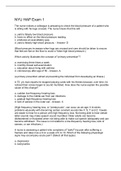
-
NYU HAP Exam 1 Questions And Answers
- Exam (elaborations) • 13 pages • 2023
- Available in package deal
-
- $12.49
- + learn more
The nurse notices a colleague is preparing to check the blood pressure of a patient who is sitting with his legs crossed. The nurse knows that this will: a. yield a falsely low blood pressure. b. have no effect on the blood pressure reading. c. produces an auscultatory gap. d. yield a falsely high blood pressure. - Answer- D (Blood pressure increases when legs are crossed and care should be taken to ensure that feet are flat on the floor to avoid a *false high blood pressure.) Which ...
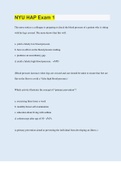
-
NYU HAP Exam 1 | 75 Questions with 100% Correct Answers | Verified | Latest Update | 24 Pages
- Exam (elaborations) • 24 pages • 2023
-
- $12.49
- + learn more
The nurse notices a colleague is preparing to check the blood pressure of a patient who is sitting with his legs crossed. The nurse knows that this will: a. yield a falsely low blood pressure. b. have no effect on the blood pressure reading. c. produces an auscultatory gap. d. yield a falsely high blood pressure. - D (Blood pressure increases when legs are crossed and care should be taken to ensure that feet are flat on the floor to avoid a *false high blood pressure.) Which activity ill...
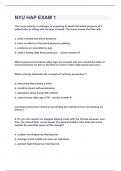
-
NYU HAP EXAM 1|UPDATE&VERIFIED|100% SOLVED|GUARANTEED SUCCESS
- Exam (elaborations) • 20 pages • 2023
-
- $13.99
- + learn more
The nurse notices a colleague is preparing to check the blood pressure of a patient who is sitting with his legs crossed. The nurse knows that this will: a. yield a falsely low blood pressure. b. have no effect on the blood pressure reading. c. produces an auscultatory gap. d. yield a falsely high blood pressure. D (Blood pressure increases when legs are crossed and care should be taken to ensure that feet are flat on the floor to avoid a *false high blood pressure.) Which activ...
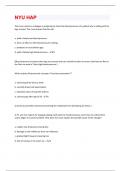
-
NYU HAP | Questions with 100 % correct answers | Verified
- Exam (elaborations) • 18 pages • 2023
-
- $7.49
- + learn more
The nurse notices a colleague is preparing to check the blood pressure of a patient who is sitting with his legs crossed. The nurse knows that this will: a. yield a falsely low blood pressure. b. have no effect on the blood pressure reading. c. produces an auscultatory gap. d. yield a falsely high blood pressure. - D (Blood pressure increases when legs are crossed and care should be taken to ensure that feet are flat on the floor to avoid a *false high blood pressure.) Which activity ill...
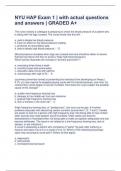
-
NYU HAP Exam 1 | with actual questions and answers | GRADED A+
- Exam (elaborations) • 11 pages • 2023
-
- $10.49
- + learn more
NYU HAP Exam 1 | with actual questions and answers | GRADED A+ The nurse notices a colleague is preparing to check the blood pressure of a patient who is sitting with his legs crossed. The nurse knows that this will: a. yield a falsely low blood pressure. b. have no effect on the blood pressure reading. c. produces an auscultatory gap. d. yield a falsely high blood pressure. - D (Blood pressure increases when legs are crossed and care should be taken to ensure that feet are flat on...
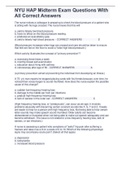
-
NYU HAP Midterm Exam Questions With All Correct Answers
- Exam (elaborations) • 14 pages • 2023
- Available in package deal
-
- $12.79
- + learn more
NYU HAP Midterm Exam Questions With All Correct Answers The nurse notices a colleague is preparing to check the blood pressure of a patient who is sitting with his legs crossed. The nurse knows that this will: a. yield a falsely low blood pressure. b. have no effect on the blood pressure reading. c. produces an auscultatory gap. d. yield a falsely high blood pressure. - CORRECT ANSWERS D (Blood pressure increases when legs are crossed and care should be taken to...
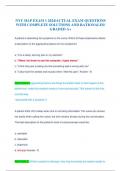
-
NYU HAP EXAM 1 2024/ACTUAL EXAM QUESTIONS WITH COMPLETE SOLUTIONS AND RATIONALES/ GRADED A+
- Exam (elaborations) • 23 pages • 2024
- Available in package deal
-
- $13.99
- + learn more
NYU HAP EXAM 1 2024/ACTUAL EXAM QUESTIONS WITH COMPLETE SOLUTIONS AND RATIONALES/ GRADED A+ A patient is describing his symptoms to the nurse. Which of these statements reflects a description of the aggravating factors for his symptoms? a. "It is a sharp, burning pain in my stomach." b. "When I sit down to use the computer, it gets worse." c. "I think this pain is telling me that something bad is wrong with me." d. "I also have the sweats and nausea when I feel this pain." Answe...
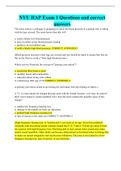
-
NYU HAP Exam 1 Questions and correct answers
- Exam (elaborations) • 14 pages • 2023
-
- $9.99
- + learn more
NYU HAP Exam 1 Questions and correct answers The nurse notices a colleague is preparing to check the blood pressure of a patient who is sitting with his legs crossed. The nurse knows that this will: a. yield a falsely low blood pressure. b. have no effect on the blood pressure reading. c. produces an auscultatory gap. (Blood pressure increases when legs are crossed and care should be taken to ensure that feet are flat on the floor to avoid a *false high blood pressure.) Which activit...
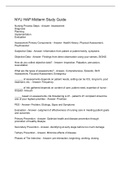
-
NYU HAP Exam 1 Questions And Answers/HAP Exam 1 Questions And Answers/HAP Midterm Exam Practice Questions/HAP Midterm Practice Questions And Answers/NYU HAP Exam 1 - Questions And Answers/HAP Final Exam LOA Questions And Answers/NYU HAP Midterm Study Guid
- Package deal • 7 items • 2023
-
- $35.49
- + learn more
NYU HAP Exam 1 Questions And Answers/HAP Exam 1 Questions And Answers/HAP Midterm Exam Practice Questions/HAP Midterm Practice Questions And Answers/NYU HAP Exam 1 - Questions And Answers/HAP Final Exam LOA Questions And Answers/NYU HAP Midterm Study Guide

-
NYU HAP Midterm Study Guide
- Other • 6 pages • 2023
- Available in package deal
-
- $10.99
- + learn more
Nursing Process Steps - Answer- Assessment Diagnosis Planning Implementation Evaluation Assessment Primary Components - Answer- Health History, Physical Assessment, Psychosocial Subjective Data - Answer- Information from patient or patient family, symptoms Objective Data - Answer- Findings from direct observation using your senses, SIGNS How do you collect objective data? - Answer- Inspection, Palpation, percussion, Auscultation What are the types of assessments? - Answer- Com...



